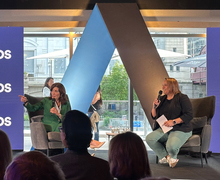Trendy activism doesn’t warrant a younger voting age
Audra Lisner | Assistant Illustration Editor
16 year olds can’t be trusted with a ballot.
UPDATED: Friday, Oct. 12, 2018 at 5:01 p.m.
Scotland and New Zealand have a voting age of 16, and now Washington, D.C. may try to follow suit. A bill could soon be passed lowering the voting age minimum to 16 in the District of Columbia.
That’s not a great idea.
While teenage Americans demonstrate political activism, and impressively assemble to shift political discussions and advocate for change, I don’t believe lowering the voting age will significantly fix anything in our country.
Residents in the United States already have a lousy — but deserved — reputation of not turning out at the polls. We talk the talk, but when it comes time to vote, not everyone really takes action. As opinionated and divided as this country may seem, you would think people wouldn’t hesitate to voice their opinions via a ballot.
But that’s not the case. Adding more youths to that mix won’t make it any better.
On one hand, it could be argued that young people are more informed and passionate in regard to their political environment. But they can also be easily influenced by parents’ views.
People only participate in political activism temporarily, in some cases. It’s now trendy to attend protests, so is today’s environment really the start of the American youth’s political awakening? A fad doesn’t warrant a legislative change.
Young students hold megaphones and repeat commonly-used narratives over and over again, thinking shouting makes them seem angrier and angstier — angrier and angstier being the equation that equals importance.
I say this not to diminish the great work that young people have done in the past year. But the voting age is already low enough.
Lowering the age any further to allow others to vote would put the integrity of voting at risk. Ideally, people should be informed about their voting choices. But we’ve seen adults already faulting this system — so there’s no question that children wouldn’t have the emotional and intellectual capability to responsibly make a sound choice for themselves and their country.
Jaylon Coaxum is a freshman communications and rhetorical studies major. His column appears biweekly. He can be reached at jccoaxum@syr.edu.
This post has been updated with appropriate style.
Published on October 10, 2018 at 8:59 pm





